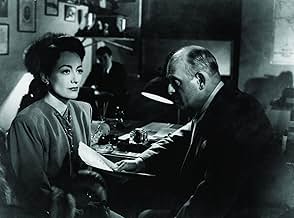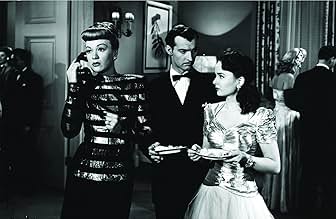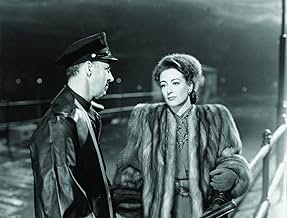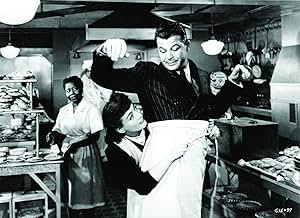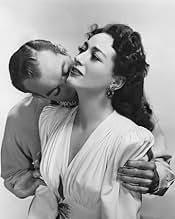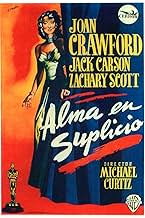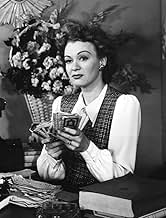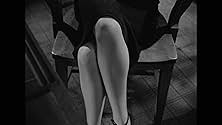CALIFICACIÓN DE IMDb
7.9/10
30 k
TU CALIFICACIÓN
Una madre trabajadora avanza hacia la deriva cuando se divorcia de su marido y monta un exitoso negocio de restaurantes para mantener a su hija malcriada.Una madre trabajadora avanza hacia la deriva cuando se divorcia de su marido y monta un exitoso negocio de restaurantes para mantener a su hija malcriada.Una madre trabajadora avanza hacia la deriva cuando se divorcia de su marido y monta un exitoso negocio de restaurantes para mantener a su hija malcriada.
- Dirección
- Guionistas
- Elenco
- Ganó 1 premio Óscar
- 3 premios ganados y 7 nominaciones en total
Bill Alcorn
- Soldier
- (sin créditos)
Betty Alexander
- Party Guest
- (sin créditos)
Ramsay Ames
- Party Guest
- (sin créditos)
George Anderson
- Peterson's Assistant
- (sin créditos)
James Anderson
- Diner Customer
- (sin créditos)
Robert Arthur
- High School Boy
- (sin créditos)
Lynn Baggett
- Waitress
- (sin créditos)
Leah Baird
- Police Matron
- (sin créditos)
Resumen
Reviewers say 'Mildred Pierce' is acclaimed for its strong female lead, complex dynamics, and themes of maternal love and social class. Joan Crawford's Oscar-winning performance is celebrated, and the film's noir elements are noted. However, some find the pacing slow and melodrama excessive, with Veda's character criticized. Despite this, it's seen as a classic with significant historical portrayal of women's roles.
Opiniones destacadas
Six shots fired and a man falls down dead. Shortly thereafter, we meet a desperate Mildred Pierce who walks along the streets of the night. After a policeman prevented her from jumping into the river, she ends up at a bar where an old acquaintance flirts uncontrollably. They go to her house on the beach, from Mildred suddenly quickly departs. It turns out that it was in this house that the man was shot and soon the police on the spot. During interrogation begins the story of what led up to that fateful night. Mildred tells how she differs from her husband, working upward as a business woman and how she is willing to do absolutely everything to their already spoiled daughter Veda.
Mildred Pierce literally sparkles. Director Michael Curtiz, probably best known for Casablanca, knows how to get the luxurious feel of a grand noir drama. Elegant small transitions, meticulous and dramatic lighting applications, all in classic Hollywood manner, where nothing is left to chance.
The dialog is fabulous. Mildred's right hand Ida is so cool, with the hatching of witty one-liners. Even the ever-swarming Wally Fay is constantly exciting to listen to.
The story in itself is exciting, where you always know roughly how it will end, but not why or what role some of the characters will play. The characters are the driving force. It's about Mildred's efforts to give their daughters the life she had wanted, although it also means she does not listen to what they really want. Then there is a former spouse who is living his new life in the periphery, the friend who is helpful, but not without being sure to reap the rewards of Mildred's success and even a new one that might not be what he appears to be.
Crawford got a well-deserved Oscar for this film.
Mildred Pierce literally sparkles. Director Michael Curtiz, probably best known for Casablanca, knows how to get the luxurious feel of a grand noir drama. Elegant small transitions, meticulous and dramatic lighting applications, all in classic Hollywood manner, where nothing is left to chance.
The dialog is fabulous. Mildred's right hand Ida is so cool, with the hatching of witty one-liners. Even the ever-swarming Wally Fay is constantly exciting to listen to.
The story in itself is exciting, where you always know roughly how it will end, but not why or what role some of the characters will play. The characters are the driving force. It's about Mildred's efforts to give their daughters the life she had wanted, although it also means she does not listen to what they really want. Then there is a former spouse who is living his new life in the periphery, the friend who is helpful, but not without being sure to reap the rewards of Mildred's success and even a new one that might not be what he appears to be.
Crawford got a well-deserved Oscar for this film.
Joan Crawford won the Academy Award for Best Actress for her portrayal of the title character in this 1945 offering by Warner Brothers. Ms. Crawford was in her prime then and members of my generation, who remember her in films such as 1968's Berserk and 1970's Trog, are sometimes surprised to learn how attractive and talented she was in her heyday. The mean-spirited commentary of her life which we have been subjected to since her death in 1977 notwithstanding, still there was a certain hard edge to her personality which shown through in her screen roles. That she was able to win filmdom's greatest prize by playing a willing victim and vulnerable woman is perhaps the greatest tribute to her abilities as an artist. At any rate, she was the star of this film noir classic, a story that holds up well after 57 years. Mildred Pierce was an ordinary housewife of the era. No skills, relied on her husband for sustenance and leadership and was crushed when he ditched her for another woman. Her daughters were her whole life, doting unhealthily on Veda, the older one, especially (a very young Ann Blyth, herself nominated for Best Supporting Actress for this film). But, Veda was a schemer, conniver and social climber from the word go and it was ultimately her actions which brought an interesting human interest story to a thunderous climax. The story fascinates as we see Crawford, through iron will and determination, become an independent, successful business woman even as she makes tragic error after tragic error in her personal life. Mildred Pierce really is a rare animal, as it truly is more of a human interest story than any other in the film noir genre. The cast is great: Jack Carson, outstanding as Mildred's lifelong friend and would-be suitor, Bruce Bennett as Mildred's nice but weak-willed husband, Zachary Scott as the caddish successor to Bruce Bennett for Mildred's affections, and Eve Arden (still another nomination for Best Supporting Actress) in one of her trademark roles as a no nonsense gal pal. In Mildred Pierce, we have murder, love, misguided love, love not reciprocated, jealousy, misunderstanding, and good intentions/bad results. Could it be this film is so intriguing because we see in our own lives one or more of these very human conditions?
Mildred Pierce is directed by Michael Curtiz and adapted from the James M. Cain novel by Ranald MacDougall, William Faulkner and Catherine Turney. It stars Joan Crawford, Ann Blyth, Jack Carson, Zachary Scott, Bruce Bennett and Eve Arden. Music is by Max Steiner and the cinematographer is Ernest Haller. It was nominated for 6 Academy Awards and won just the one for Crawford in the Best Actress category.
Plot finds Crawford as Mildred Pierce, a devoted Mother of two girls who struggles to not only make her marriage work, but to also keep her eldest daughter, Veda (Blyth), in the luxurious life she demands. Murder, treachery and heartache is about to dog the Pierce family.
This is of course the film that is often remembered for being the film that saved Joan Crawford's career. After being dumped by MGM, and tagged with being box office poison, Crawford, it seemed, was destined to be the latest visitor to the acting scrap heap. But Jerry Wald over at Warner Brothers had other ideas. The part of Mildred had been offered to some of the big hitting ladies on the Warner studio lot, Stanwyck, Davies and Sheridan are just three of the names known to have shied away from the role. The feeling was that playing a woman with a mid-teen daughter was a no go for the age proud ladies. But Crawford, just entering her forties, took the role on, and in spite of initial protestations from director Curtiz, gave a terrific performance that landed her the coveted golden statuette and prolonged her film career for another 25 years.
Blending the psychological aspects of the woman's picture with the physical edges of film noir, "Mildred Pierce" is something of a unique picture. Very popular on release (it was a box office smash), it was thought that Cain's source novel wouldn't transfer well to the screen. Credit then to the writers for managing to create such an intriguing and watchable piece. True, they have had to tone down aspects from the book, and even added incidents and changed characters, but the essence is right and the timing couldn't have been more perfect for such a story. As film noir was becoming a telling style of film making, the pic also coincided with the later stages of WWII - a time when the role of the Woman, either in the service or at home, was under scrutiny. One of the great things about the film, and the performance of Crawford, is that it cobbles together many character strands of the 40s woman - in life and in film noir. She's a Suzy homemaker type, asked to be mother and wife, yet driven to be a business woman because she feels she's lacking in the necessary family home department. Where the film gets its noir flecks from is that Mildred may also be a murderer, a femme fatale, a woman whose every decision spells trouble. It's as if the makers (not just here but many others at the time) are saying that a woman's place is in the home, doing homely family stuff. Intriguing for sure, not necessarily in good taste, but an added spice into the melodramatic cooking pot that already contains greed and obsession.
Told with a flashback structure, the film is smoothly directed by the versatile Curtiz. But both he and Crawford are aided considerably across the board, not least by a truly great "Bitch" performance from Blyth. Veda is at one detestable, spoilt and mean, the daughter from hell, a status-seeking brat whose love comes at enormous cost to those who dare to get close to her. Blyth revels in it and her play off with Crawford is one of the film's major strengths. The support cast of Scott, Carson, Arden and Bennett are excellent value, while Steiner's music is unobtrusive and able to shift freely with the narrative twists. Finally it's left to Hallers photography to capture the feel and mood of the unfolding story. Shifting from sunny suburbia one moment to shadowy expressionistic bleakness the next, the photographer of such notable film's like "Gone With the Wind" and "Rebel Without a Cause", is integral to the moody excellence of "Mildred Pierce".
A murder mystery flanked by asides of class distinction, bad parenting, dubious sexual leanings and pure greed. Yep, "Mildred Pierce" is no ordinary movie - and hooray for that. 8.5/10
Plot finds Crawford as Mildred Pierce, a devoted Mother of two girls who struggles to not only make her marriage work, but to also keep her eldest daughter, Veda (Blyth), in the luxurious life she demands. Murder, treachery and heartache is about to dog the Pierce family.
This is of course the film that is often remembered for being the film that saved Joan Crawford's career. After being dumped by MGM, and tagged with being box office poison, Crawford, it seemed, was destined to be the latest visitor to the acting scrap heap. But Jerry Wald over at Warner Brothers had other ideas. The part of Mildred had been offered to some of the big hitting ladies on the Warner studio lot, Stanwyck, Davies and Sheridan are just three of the names known to have shied away from the role. The feeling was that playing a woman with a mid-teen daughter was a no go for the age proud ladies. But Crawford, just entering her forties, took the role on, and in spite of initial protestations from director Curtiz, gave a terrific performance that landed her the coveted golden statuette and prolonged her film career for another 25 years.
Blending the psychological aspects of the woman's picture with the physical edges of film noir, "Mildred Pierce" is something of a unique picture. Very popular on release (it was a box office smash), it was thought that Cain's source novel wouldn't transfer well to the screen. Credit then to the writers for managing to create such an intriguing and watchable piece. True, they have had to tone down aspects from the book, and even added incidents and changed characters, but the essence is right and the timing couldn't have been more perfect for such a story. As film noir was becoming a telling style of film making, the pic also coincided with the later stages of WWII - a time when the role of the Woman, either in the service or at home, was under scrutiny. One of the great things about the film, and the performance of Crawford, is that it cobbles together many character strands of the 40s woman - in life and in film noir. She's a Suzy homemaker type, asked to be mother and wife, yet driven to be a business woman because she feels she's lacking in the necessary family home department. Where the film gets its noir flecks from is that Mildred may also be a murderer, a femme fatale, a woman whose every decision spells trouble. It's as if the makers (not just here but many others at the time) are saying that a woman's place is in the home, doing homely family stuff. Intriguing for sure, not necessarily in good taste, but an added spice into the melodramatic cooking pot that already contains greed and obsession.
Told with a flashback structure, the film is smoothly directed by the versatile Curtiz. But both he and Crawford are aided considerably across the board, not least by a truly great "Bitch" performance from Blyth. Veda is at one detestable, spoilt and mean, the daughter from hell, a status-seeking brat whose love comes at enormous cost to those who dare to get close to her. Blyth revels in it and her play off with Crawford is one of the film's major strengths. The support cast of Scott, Carson, Arden and Bennett are excellent value, while Steiner's music is unobtrusive and able to shift freely with the narrative twists. Finally it's left to Hallers photography to capture the feel and mood of the unfolding story. Shifting from sunny suburbia one moment to shadowy expressionistic bleakness the next, the photographer of such notable film's like "Gone With the Wind" and "Rebel Without a Cause", is integral to the moody excellence of "Mildred Pierce".
A murder mystery flanked by asides of class distinction, bad parenting, dubious sexual leanings and pure greed. Yep, "Mildred Pierce" is no ordinary movie - and hooray for that. 8.5/10
The story that unfolds in Mildred Pierce is complicated and dark, and at its darkest, is a chilling portrait of a mother so devoted to her children (well, child, really) that she would go to any and all lengths for them. Although some of the situations and scenes suffer from the passage of time (the modern audience in the cinema, myself included, couldn't help laughing at some of the more ludicrous things said/done), the film as a whole worked, mostly on the strength of the performances.
Joan Crawford won her only Oscar for her role, and it was well-deserved--she held the film together with a confident performance that ranged from charming and sassy, to desperate and almost frightening. The final scenes of the film, especially, captured Mildred at her most pathetic, and Crawford looked utterly despondent in the telephone scene. Ann Blyth is utterly convincing as the spoilt, deeply disturbed Veda, narcissistic and unrelentingly manipulative of her mother. And the best supporting performance had to come from Eve Arden, who played Mildred's friend Ida--Arden saunters across the screen, stealing scenes left and right, before disappearing from view again. She was excellent!
The film is well worth the watch--not brilliant, but definitely very good. I also like the story-telling technique and the direction (the director made quite clever and frequent use of shadows and mirrors), and it's good that the darkness and melodrama was frequently mitigated by the well-written dialogue. 8/10.
Joan Crawford won her only Oscar for her role, and it was well-deserved--she held the film together with a confident performance that ranged from charming and sassy, to desperate and almost frightening. The final scenes of the film, especially, captured Mildred at her most pathetic, and Crawford looked utterly despondent in the telephone scene. Ann Blyth is utterly convincing as the spoilt, deeply disturbed Veda, narcissistic and unrelentingly manipulative of her mother. And the best supporting performance had to come from Eve Arden, who played Mildred's friend Ida--Arden saunters across the screen, stealing scenes left and right, before disappearing from view again. She was excellent!
The film is well worth the watch--not brilliant, but definitely very good. I also like the story-telling technique and the direction (the director made quite clever and frequent use of shadows and mirrors), and it's good that the darkness and melodrama was frequently mitigated by the well-written dialogue. 8/10.
The characterization of film noire is applied to certain films that touch on the grittier, more cynical aspects of life. This genre is typified as having lead roles played by strong, solemn male characters, in this respect, Mildred Pierce is an exception. In all other ways Mildred Pierce follows the model for a great film noire. The main character encounters both success and crushing emotional hardships, which the viewer gets to see the effects of. The supporting characters do a wonderful job depicting deceit in action, and each individual character contributes moving specific parts of the film along. The film ends with somewhat of an untied knot, and the viewer could certainly learn to love Mildred as the epitome of a "tragic hero". The film starts with a mystery and works it's way backwards, and as you can assume the viewer imagines he/she knows what is going on, when clearly the writer has us at his whims. Great acting. Great tragedy. Great film noire.
¿Sabías que…?
- TriviaAfter seeing the film, James M. Cain sent Joan Crawford a signed first edition of the original novel. The inscription read: "To Joan Crawford, who brought Mildred Pierce to life just as I had always hoped she would be, and who has my lifelong gratitude."
- ErroresMildred's house on Corvallis Street in Glendale is shown as a one-story Spanish-style bungalow; however, the interior has a staircase leading to the bedrooms.
- Citas
Ida Corwin: [to Wally about his lustful looks in her direction] Leave something on me. I might catch cold.
- Créditos curiososThe opening credits are presented with a background ocean scene that "washes" the credits on the screen.
- Versiones alternativasAlso shown in computer colorized version.
- ConexionesFeatured in Hollywood: The Fabulous Era (1962)
- Bandas sonorasYou Must Have Been a Beautiful Baby
(uncredited)
Music by Harry Warren
Lyrics by Johnny Mercer
Played and sung at Wally's club toward the beginning
Also played when Veda and Ted are at Wally's club
Selecciones populares
Inicia sesión para calificar y agrega a la lista de videos para obtener recomendaciones personalizadas
- How long is Mildred Pierce?Con tecnología de Alexa
Detalles
Taquilla
- Presupuesto
- USD 1,453,000 (estimado)
- Total a nivel mundial
- USD 11,751
- Tiempo de ejecución1 hora 51 minutos
- Color
- Relación de aspecto
- 1.37 : 1
Contribuir a esta página
Sugiere una edición o agrega el contenido que falta

Principales brechas de datos
What is the streaming release date of El suplicio de una madre (1945) in Brazil?
Responda



